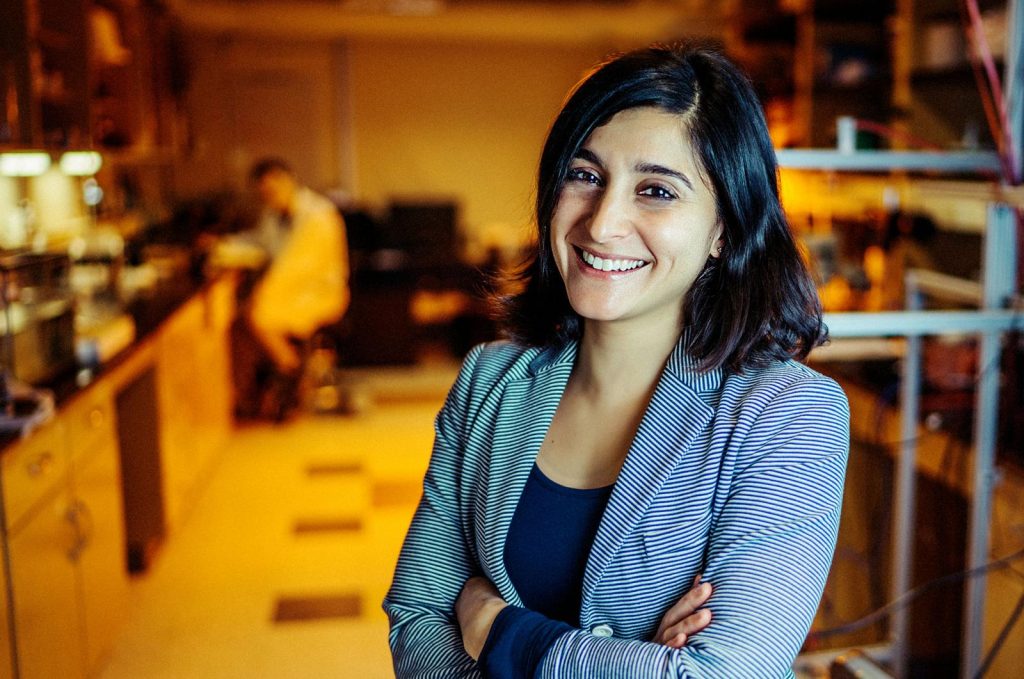
Prof. Bourouiba inside of a lab at Massachusetts Institute of Technology.
IMES faculty member uses research to inform infections disease policy during COVID-19 Pandemic.
Priscilla King Gray Public Service Center
“It comes from the heart” is how Lydia Bourouiba, PhD, Associate Professor in Civil and Environmental Engineering, Mechanical Engineering, and the Institute of Medical Engineering and Science, and the 2023 Faculty recipient of the Paul Gray Award for Public Service, would describe her relationship with outreach and service. Her scientific expertise in fluid physics and infectious disease transmission, united with her concern for public health, played a vital role in educating government agencies and a range of stakeholders to adopt health and safety policies that reduced COVID-19 transmission, associated illness, and death.
The COVID-19 pandemic emphasized the importance of timely, accurate scientific information about the mechanics of disease transmission and the value of sharing clear safety guidance with the public. Bourouiba’s research and advocacy challenged the prevailing public health guidelines about respiratory infectious disease transmission and mitigation that Bourouiba knew underplayed the speed and distance that airborne droplets from exhalations could spread the virus, with important implications for front-line healthcare workers in particular.
A group of eight esteemed faculty members collectively nominated Bourouiba for the Paul Gray Faculty Award. Her nominators shared, “Gravely concerned that infection control guidelines were not compatible with the latest scientific evidence, particularly in a time of a developing global pandemic, in March of 2020 Lydia published a highly influential article in the Journal of the American Medical Association (JAMA), outlining the risks associated with such underestimation and providing direct high-speed videographic evidence that in just a few seconds sneezes can propel their droplet payload to 8 meters, thus contaminating surfaces and the air over much larger distances than previously thought. Lydia’s JAMA paper gave front-line healthcare providers strong scientific evidence to request N95 respirators while caring for COVID-19 patients when the CDC was merely recommending loosely fitting surgical masks at the time. Subsequently, Lydia’s work has been cited in government briefing documents on the pandemic around the world.”
Furthermore, they wrote, “While this is tangible evidence in and of itself of the social and public health issues that Lydia has addressed through her research, she also recognized that in a time of worldwide pandemic, it is not enough to wait for government agencies to update their recommendations, which is typically a lengthy, consensus-driven, and often political process. Rather, to affect immediate awareness and change, she decided that it was imperative to engage with, advise and educated the general public directly.”
Prof. Bourouiba giving a TED Talk in 2018 on how diseases and epidemics move through a breath of air.
Her research and insight in disease transmission as described by her nominators “have influenced front-line healthcare providers, policy makers, national and international healthcare organizations, and the lay public alike, and now have thrust her into a leadership role in establishing preparedness for future pandemics.”
Bourouiba’s research was in high demand by healthcare providers during the pandemic as hospital workers needed proper medical equipment to combat the spread of COVID-19. She also advised long-term care facilities in crafting policies during the pandemic to keep vulnerable populations safe.
A trained mathematical physicist, Bourouiba came to MIT as pre-faculty in the Mathematics Department in 2010 and became a faculty member in 2014. While working towards her doctoral degree at McGill University, she specialized in fluid physics, specifically theoretical turbulence, while also training in mathematical epidemiology. Surprised by a complete lack of mechanistic understanding of host-to-host transmission and recognizing the ubiquity of rich fluid phenomena involved, Bourouiba founded the Fluid Dynamics of Disease Transmission Laboratory in 2014, a research initiative dedicated to the discovery of fundamental, mechanistic insights of pathogen transmission–primarily from the lens of fluid physics and biophysics–and their harnessing into novel transmission mitigation strategies. To achieve these goals, the lab develops novel tools and methods of interrogating the relevant fluid physics at the length scale of the pathogen and at time scales relevant to disease transmission in living organisms like humans, plants, and animals.
For over 14 years, Bourouiba has dedicated herself to research, teaching, mentoring and public education and policy outreach related to disease transmission and remains involved at the national and international level in public health reform, working with the Policy Lab at MIT’s Center for International Studies, and government and public agencies like the World Health Organization, the French Society for Hospital Hygiene, or the Public Health Agency of Canada.
Regarding her interest in disease transmission and infectious diseases, Bourouiba shared with the PKG Center that “infectious diseases are arguably the most impactful to the public, profoundly shaped history repeatedly, and outrageously continue to and affect the vulnerable and marginalized, the poor, and resource limited communities the most. With the health consequences of the climate crisis, this injustice is on track to be exacerbated.”
“Lydia is the epitome of what we should be recognizing with an award for addressing pressing issues of our day, through her scholarship, teaching, and service to the community at large,” her nominators shared. She “has performed a significant service to the public through her scientific leadership and the clarity of her communication as the world relied on her insights for its health and safety.”
The PKG Center’s Paul Gray Faculty Award honors Professor Bourouiba for combining her rigorous science with tenacious advocacy and leadership to change public health policy, thereby altering the global response to the pandemic and, undoubtedly, saving countless lives. Congratulations, Professor Bourouiba!
* Originally published by Priscilla King Gray Public Service Center.
